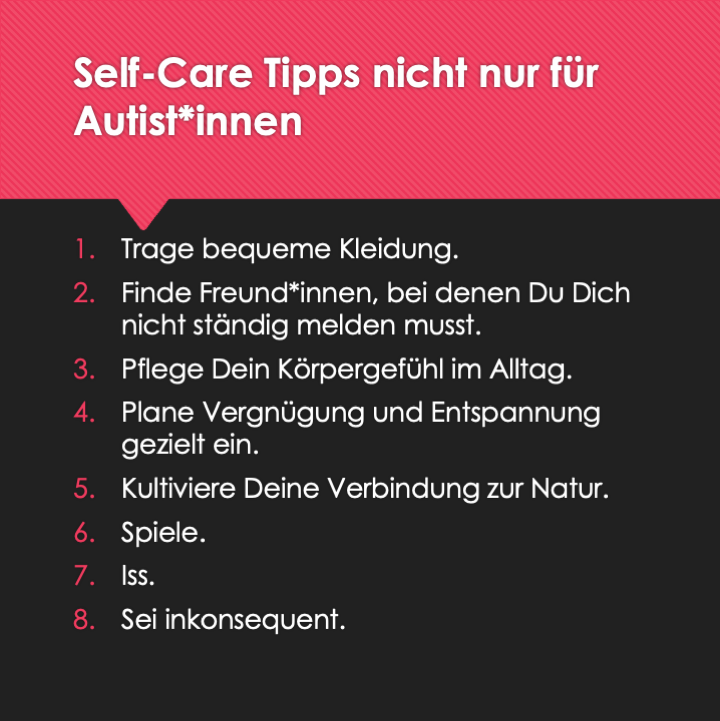Sieben Selbstfürsorgetipps für alle* die sie brauchen und ein achter wirklich nur für Autist*innen, aus meiner Erfahrung


Sieben Selbstfürsorgetipps für alle* die sie brauchen und ein achter wirklich nur für Autist*innen, aus meiner Erfahrung
Content warning: mention of sexual violence and transphobia
Disclaimer: This article focuses on non-binary trans individuals and mainly speaks of their experiences, told from one person’s point of view. Every person is different and so are their needs and experiences! Not everyone necessarily identifies with these particular labels of ‘transgender’ and ‘non-binary’ either, and binary trans folx might need you to do gender completely differently!

Maybe someone you know asked you to change the pronouns you refer to them with, maybe someone new you’re seeing just told you they are non-binary, or maybe you are sitting in a classroom with a genderqueer person and you don’t know! Whatever the situation, it is important that you take into consideration that not everyone around you is cisgender, ie. someone who identifies with the gender that is typically associated with their sex assigned at birth, for example, a cis woman could be someone who identifies as a woman and is assigned female at birth (afab). It is important to note that both the ideas of ‘sex’ and ‘gender’ are socially contructed and in reality, neither of them exist in binaries (look up: Intersex people and Indigenous genders like Two-Spirit). There may be many genderqueer people around you who, for whatever reasons, are not open about their identity. Queer people in general are under no obligation to let you know how they identify and there may be many reasons why someone would not be comfortable sharing personal information. Regardless, it is on all of us to work through our misconceptions of gender and make sure that the genderqueer people in our life feel understood and valid!
This writing is meant to serve as general guidelines on how to interact with the genderqueer and non-binary people in your life, especially friends and people who you are in romantic and/or sexual relationships with. There are some aspects of verbal, romantic and sexual intimacy that may be different when you take gender out of the equation, or at least radically recalibrate conventional gender norms. While a lot of this information applies to when you are interacting with a genderqueer person in any setting, some of this is only okay when are you in some form of intimate relationship with someone, whether platonic or otherwise, so please bear with caution and treat each individual situation as unique and specific!
Please keep in mind that asking for someone’s pronouns, while standard in a lot of places and rather necessary, can be triggering for someone, especially if they are questioning and are actively in the process of figuring out how they want to be addressed.

Beachte aufmerksam was er*sie sagt, schreibt oder gebärdet und glaube es. Suche nicht nach verborgenen Bedeutungen oder Hintergedanken darin. Nimm stattdessen die Worte Deine*r Partner*in ernst, auch wenn Du sie zunächst nicht verstehst, sie Dir nicht plausibel erscheinen oder Du an seiner*ihrer Stelle anders fühlen oder denken würdest. Das gilt insbesondere dann wenn Dein*e Partner*in über seine*ihre eigenen Wahrnehmungen, Gefühle und Selbstdefinitionen Auskunft gibt. Wenn Dein*e Partner*in sich als autistisch, neurodivergent, neurodivers oder behindert bezeichnet, dann ist das eine wichtige Information über sein*ihr Erleben und Empfinden, die Du nicht mit Klischees wie „Modediagnose“ oder mit Vergleichen mit bekannten Autist*innen abtun, zerreden oder wegdiskutieren solltest, insbesondere wenn Dir wirklich was an der anderen Person liegt. Umgekehrt ist es auch nicht hilfreich einer Person, die sich selbst vielleicht als schüchtern, nüchtern, kopflastig, introvertiert oder ganz einfach mit seinem*ihrem Namen bezeichnet, ein psychiatrisches Etikett aufkleben zu wollen, besonders, ich wiederhole, wenn einem an der Person etwas liegt. In der eigenen (Selbst-)Wahrnehmung ernstgenommen und anerkannt zu werden ist für jeden Menschen wichtig, zumal in einer Liebesbeziehung oder Freundschaft. Für manche von uns ist es so wichtig wie für viele von Euch vielleicht sexuelle Treue.